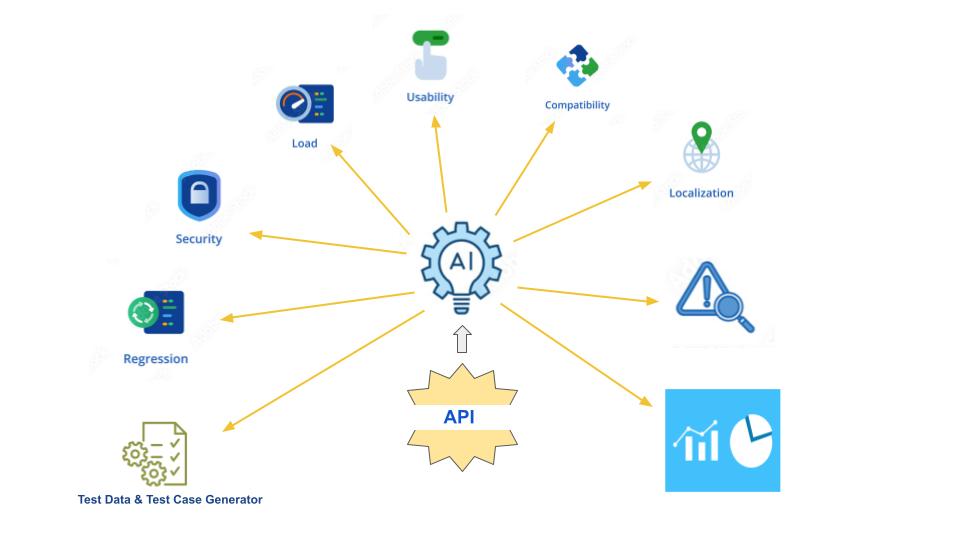Abstract
With the rapid proliferation of application programming interfaces (APIs) in modern software development, ensuring their reliability and functionality has become paramount. Traditional methods of API testing are often time-consuming and resource-intensive. This research paper explores the role and utilization of Artificial Intelligence (AI) in the field of API testing, showcasing how AI-driven techniques enhance efficiency, coverage, and effectiveness in API testing processes. We delve into various AI-powered approaches, their benefits, challenges, and the future potential of AI in revolutionizing API testing.
Introduction
APIs serve as the backbone of modern software, facilitating communication and interaction between diverse applications and systems. The complexity and ubiquity of APIs necessitate robust testing methodologies. AI offers a promising solution to address the challenges posed by the increasing number and diversity of APIs.
The Role of AI in API Testing
Test Case Generation
AI-driven algorithms can analyze API specifications, documentation, and historical data to automatically generate test cases. These generated cases encompass a wide range of scenarios, ensuring comprehensive testing.
Dynamic Test Data Generation
AI can assist in generating diverse and realistic test data, including valid, invalid, and edge-case inputs, improving API test coverage.
Test Execution Automation
AI-powered testing tools can automate the execution of test cases, simulating user interactions and validating responses efficiently.
Regression Testing
AI can monitor API behavior changes and autonomously update test cases to ensure that existing functionalities remain intact during API updates.
Performance Testing
AI can help enhance load testing by simulating various user behaviors and traffic patterns, identifying and analyzing performance bottlenecks.
Security Testing
AI can automate security scanning, identifying vulnerabilities like SQL injection, XSS, and authentication weaknesses, bolstering API security.
Usability Testing
AI can enhance usability testing with areas like user behavior analysis for UX improvement suggestions, natural language understanding to assess user feedback, automated test case generation based on user personas.
Reliability and Availability Testing
AI can ensure reliability and availability of software products by predictive maintenance and preemptive issue resolution, real time monitoring for fault detection and adaptive testing strategies for resilience testing.
Scalability Testing
AI can support scalability testing through AI-driven test case generation for scaling scenarios, dynamic resource allocation for distributed testing and adaptive load balancing for resource optimization
Defect Identification
AI identifies anomalies in API responses, including subtle defects that might be missed by manual testing.
Natural Language Processing (NLP)
AI validates API documentation, ensuring that it accurately reflects API behavior, and assists in understanding natural language inputs for testing.
Benefits and Challenges of AI in API Testing
Benefits
- Enhanced test coverage and effectiveness.
- Reduced testing cycle times.
- Improved defect detection and reporting.
- Proactive issue prediction and prevention.
- Automation of repetitive tasks.
- Efficient handling of complex test scenarios.
- Adaptation to changing testing requirements.
Challenges
- Data privacy and security concerns.
- Requirement for labeled data for machine learning.
- Algorithm explainability and transparency.
- Integration with existing testing processes.
- Initial setup and training costs.
- Continuous model maintenance.
Future Directions and Potential
The future of AI in API testing holds significant promise. Potential avenues for exploration include:
- AI-driven automated test environment provisioning.
- Real-time adaptive testing strategies.
- AI-powered recommendation systems for test case prioritization.
- Enhanced AI models with domain-specific knowledge.
- Integration of AI with DevOps and CI/CD pipelines.
Conclusion
AI is revolutionizing the field of API testing by automating repetitive tasks, enhancing test coverage, and improving defect detection. While challenges exist, the benefits of AI-driven API testing are compelling. As the software landscape continues to evolve, AI will play an increasingly pivotal role in ensuring the reliability and security of APIs, contributing to the delivery of robust and high-quality software applications. API testing is at the forefront of this AI-driven transformation, poised to make testing more efficient and effective than ever before.

